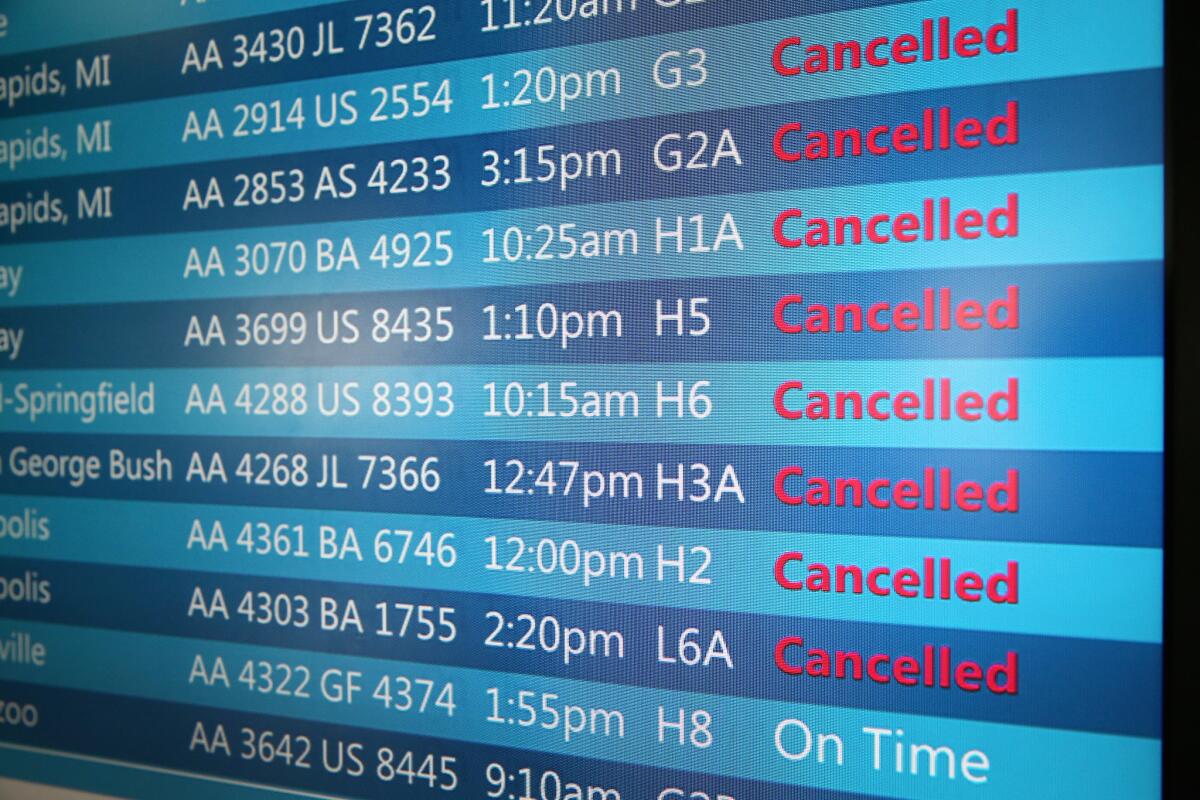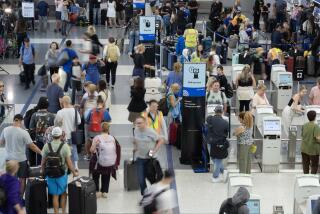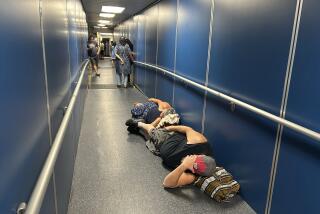How to get where you’re going when your flight gets canceled

The arrival and departure display at O’Hare International Airport shows a list of cancelled flights on September 27, 2014
Question: Six family members — four adults and two children — flew into John Wayne Airport from New York. They had return reservations, designed so they could get back home on Saturday, have a day to do things and go back to work on Monday. Instead, on Friday they were told their flight was canceled. They were on the phone for about eight hours and were told it was a problem with the crew and that the soonest they could get a flight was Monday from LAX. That flight was delayed (no pilot); they missed connections in Detroit and wound up in Connecticut at 3 a.m. None of this was their fault, but all of it was their problem. Why?
Peggy Jayne
Huntington Beach
Answer: To be a successful passenger these days means being assertive and well informed. Fliers have precious few rights, but in this case, their rights are ironclad. But nothing is handed to us on a silver platter unless we’re a “gold flier,” so absent a push from the passenger, the airline did the minimum.
The airline that Jayne’s family flew at least was forthcoming about the problems it was having. That is critical information. If it is the airline’s fault — and it was in this case — the airline is obligated by its own rules to help.
Knowing what to do often leads to better outcomes. Here, with help from Rick Seaney, founder of FareCompare and a veteran traveler, are tips and tricks you can use to get what you need (a flight home) if you’ve failed to get what you want (the flight you originally booked).
Some steps before you fly:
Create your own little packet of power, as I like to call it. This documentation, whether stored on your phone or carried as paper or on a flash drive, consists of these things: the airline’s telephone number (you can find the list at www.latimes.com/airlines), the airline’s terms and conditions or contract of carriage (found at its website — try searching one of those terms) and a list of other airlines that fly the route you’re taking. If you have your smartphone with you, download the app for your favorite airline booking method and begin searching at the first sign of trouble.
On that smartphone, download an app such as FlightStats or FlightAware. Those apps allow you to set up an alert, and if trouble’s looming, you should be notified. That means you can start calling or checking with an agent sooner than the thousands of others who will be in the same boat, so to speak. (But remember, the airline has the final word about flight cancellations; those apps are for information purposes only, Seaney reminded me.)
Steps to take when you know the flight is canceled:
Try to find out why. If it’s something within the airline’s control — mechanical or crew-related, for example — your position is much stronger. The airline is usually obligated to help you, especially if you whip out that contract/terms and conditions and point to the language that says so.
The only issue here is that the airline controls that information, not you and not your lawyer, whose name you may invoke, likely to no effect. Seaney chuckled — ruefully — when talking about this, suggesting the final arbiter of what happened is the airline, not you. Mother Nature gets blamed a lot, he noted.
If the cause is within the airline’s control, ask (nicely, always, Seaney reminded me) to be rebooked on another airline if the airline you’re on can’t accommodate you until some ridiculously far-off date like a Monday when it’s Friday.
“The airlines all have reciprocal agreements that allow this to occur,” Seaney said, then noted that there are some exceptions, including low-cost Spirit.
Jayne’s family had a right to be reaccommodated quickly; the airline in question has something called Rule 240, an old rule that s-p-e-l-l-s o-u-t this obligation. (That airline apparently couldn’t spell, among its other faults.)
And, by the way, if you have privileges at the airline’s lounge or can buy your way in, those lovely folks at the counters often can help rebook and won’t be quite as overwhelmed by the masses of people who are stranded. (A recent column by Ed Perkins details some of the ways you can be a member of a club: www.lat.ms/1MD6gV6.)
If you can’t depart from the airport where you are, ask the agent to try others. Seaney noted that we are lucky because we have a plethora of choices — Long Beach, LAX, Ontario and Burbank, besides John Wayne Airport. The same is true of many East Coast destinations, so see what’s possible.
(Jayne’s family did that by flying out of LAX. It should have helped; in this case, it didn’t because of a second airline issue. But it’s something to have in your hip pocket.)
If nothing is available — because, with airlines flying as full as they do these days, finding an open seat or seats is iffier — try to “make progress toward your destination,” Seaney said.
It may take a little courage to get on a flight that dumps you in, say, Dallas without promise of an onward ticket home, but Seaney has done that.
He also — and this is important — asks the gate agent to note in his record that he will require assistance at the next location.
If none of this works, try taking to social media to plead your case. Airlines and other travel providers will take that conversation offline amazingly quickly. (Worked for me on a recent issue with a car rental company where the desk agents were no-shows. One tweet and suddenly they were back on duty.)
Whatever the case, stay calm. Imagine, Seaney said, that you are an agent having to try to reaccommodate 200 unhappy people. Many of them aren’t nice about it. Forcing yourself to be pleasant isn’t easy, and sometimes it isn’t warranted, but remember, this is not something the agent or even the airline did to you personally; it is just something that happened.
Being proactive is imperative; being a pain in the neck is optional. Rise above it, and the goodwill you exude may be reciprocated.
If not, the outcome may be the same as if you were a jerk. But you weren’t. A clear conscience is a pretty good traveling companion.
Have a travel dilemma? Write to [email protected]. We regret we cannot answer every inquiry.
More to Read
Sign up for The Wild
We’ll help you find the best places to hike, bike and run, as well as the perfect silent spots for meditation and yoga.
You may occasionally receive promotional content from the Los Angeles Times.







